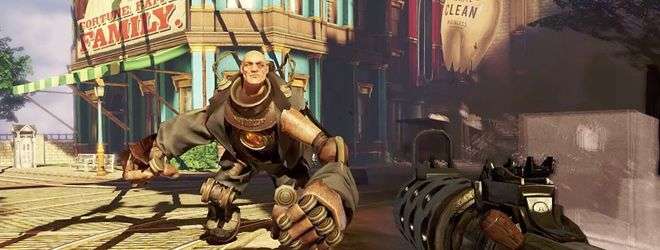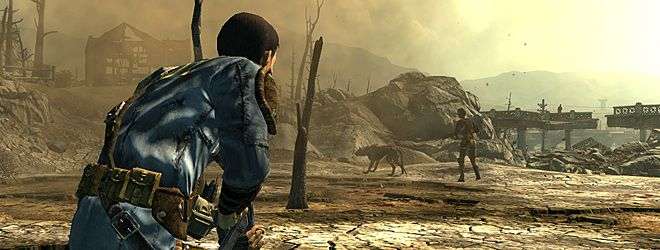When A Choice Isn’t Really A Choice At All
by Stu
 Having attained the platinum trophy on inFAMOUS Second Son this past weekend, I couldn’t help but feel as though the whole karma system was a massive let down. Mind you, this is nothing new. The illusion of choice has been prevalent for years, with a large number of games declaring that game-changing decisions can be made. With the jump-in console tech that the new generation has brought, I had hoped for a little more progression with regards to moulding games to better fit the ideology of RPG mechanics such as consequence, karma and alignment.
Having attained the platinum trophy on inFAMOUS Second Son this past weekend, I couldn’t help but feel as though the whole karma system was a massive let down. Mind you, this is nothing new. The illusion of choice has been prevalent for years, with a large number of games declaring that game-changing decisions can be made. With the jump-in console tech that the new generation has brought, I had hoped for a little more progression with regards to moulding games to better fit the ideology of RPG mechanics such as consequence, karma and alignment.
BioWare has been, in my opinion, the champions of choice mechanics. There are of course other developers out there, Telltale Games and Bethesda for example, that utilise choice and have story arcs based on who you align yourself with. No developer that I can recall has yet developed a truly revolutionary experience where actions, outlook and decisions to align to a cause have a real game-changing effect. Mass Effect, The Walking Dead and others may hand you tough choices but, ultimately, the course of the game doesn’t really change at all. Sacrifice person A or person B? It matters little other than personal preference because, either way, the one you saved will spout the same lines and play the same part the other would have done. The only real game-changing choice is usually the final one of the game, all others remaining cosmetic at best.
Would it not be more interesting and re-playable if that decision cost you an aspect of the adventure? Perhaps losing access to a unique mission arc, locations or having a larger impact on the major story would make the player more carefully consider the decision that they are making? The promise of different content or outcomes would definitely inspire me to play through a game multiple times but I suppose some might decry the inability to access all content in a single adventure.
 Second Son boasted the reaction to your karma level, but much like any other karma based game, it basically boils down to three levels: good, no influence, and evil. Predictably the neutral path becomes obsolete (you gain no extra abilities by remaining neutral) so end up taking the route of the goody two-shoes or a ruthless, murdering bastard. Even then, the reaction is a binary one. Play the good guy and people will cheer and praise, play the bad guy and people will shout insults and flee.
Second Son boasted the reaction to your karma level, but much like any other karma based game, it basically boils down to three levels: good, no influence, and evil. Predictably the neutral path becomes obsolete (you gain no extra abilities by remaining neutral) so end up taking the route of the goody two-shoes or a ruthless, murdering bastard. Even then, the reaction is a binary one. Play the good guy and people will cheer and praise, play the bad guy and people will shout insults and flee.
Why does it have to be so binary and generic? All of these systems are the same, from Fable to inFAMOUS, you are either revered or hated by all and it has no bearing or impact on your adventure. Imagine if you were evil and, during a stand-off with the authorities, have-a-go heroes also joined the fray to fight against you? Or people rallied around you when you played a character of paragon, ganging up and taking down minor enemies to ease your fights or providing regen goods after a costly battle? Other consequences like merchants refusing to deal with you or a town refusing entry until you prove yourself trustworthy, or take other options such as bribery, sneaking in, or brute force.
 Of course, there is never really accommodation for the middle of the road or varying actions. I understand the difficulty in writing a story to account for everything, but if I were to play a game as a hero and choose to take a pivotal action as a bad guy then that would be all that was remembered when the consequence occurs, not the fact that I did everything else as the perfect example of a benevolent being. The fallout from that situation is that as soon at the cutscene is over, the character who may have been horrified by my actions would then start chatting to me like nothing had happened because my overall karma level was still pretty darn good. NPCs have memories like goldfish!
Of course, there is never really accommodation for the middle of the road or varying actions. I understand the difficulty in writing a story to account for everything, but if I were to play a game as a hero and choose to take a pivotal action as a bad guy then that would be all that was remembered when the consequence occurs, not the fact that I did everything else as the perfect example of a benevolent being. The fallout from that situation is that as soon at the cutscene is over, the character who may have been horrified by my actions would then start chatting to me like nothing had happened because my overall karma level was still pretty darn good. NPCs have memories like goldfish!
Trophies and achievements haven’t helped the situation either. It’s not uncommon for achievements to be split into good route and bad route. An easy way to encourage two playthroughs and pad out the story related achievements – two for every chapter/situation. Time and pressure are another problem too. Remember those reveal trailers for BioShock Infinite when Elizabeth was using powers in battle to help Booker – such as collapsing the cart for Booker to force push at the enemies? Well that got boiled down to a pathetic AI interaction during battle that checks what you need most – ammo, salts or health – and periodically threw you one of those items or money. Such promise ultimately unrealised in the final product which, for me at least, was nothing more than an average FPS, with its only redeeming feature being the ending. At least in Skyrim and other games the escort quest mob tries to defend themselves or get involved – but I’ll stop there, otherwise I’ll end up writing an essay on why I felt BioShock Infinite was the most over-hyped and over-scored game of 2013.
Set paths towards good and evil, and the associated trophies/achievements, irks me more in RPGs than any other games because you are practically forced down a particular route if you want to go for the max. I don’t see the point in a game where the player is presented choice only to have their actions dictated by the trophies/achievements. That, of course, could mean a third ‘however I like’ playthrough for completionists who also like to just play RPGs for what they are – or it would if there was true change and meaningful consequences, but usually I’m done by that point because the experience won’t be any different.
 Sometimes though, even when there is no impact, your own attachment to a character can overrule common sense. The default situation with the council in Mass Effect 2 when starting a new game irritated me to the point where I played the original through again (from scratch on a replacement Xbox 360) just to get the desired outcome to import into the second game, even though there wasn’t really any consequence or point in having that decision pulled forward – I just wanted it. Unfortunately those situation are rare indeed and, in my case, quite irrational.
Sometimes though, even when there is no impact, your own attachment to a character can overrule common sense. The default situation with the council in Mass Effect 2 when starting a new game irritated me to the point where I played the original through again (from scratch on a replacement Xbox 360) just to get the desired outcome to import into the second game, even though there wasn’t really any consequence or point in having that decision pulled forward – I just wanted it. Unfortunately those situation are rare indeed and, in my case, quite irrational.
Skyrim also failed to deliver as I had hoped when it came to choices and impact. The outcome of the civil war mission set was less than pointless, with absolutely no impact on world or story other than the replacement of a few Jarls. How disappointing. For a game that went to the trouble of writing comments from guards and public about your actions and affiliations I had hoped for something grander in terms of consequences. Sadly, even when aligned with the Dark Brotherhood or running the Thieves Guild, other than the odd comment there was no impact on the way I was treated. Merchants would still trade with me and people would happily approach me for chats – if there were a world-famous hitman walking about in your town, would you risk their ire striking up a conversation? I think if it were me, I’d put my head down and walk the other way. But not everyone would, which is the problem in most games; unimportant NPCs all share the same view as if a hive mind is dictating their thoughts and feelings.
I don’t have the solution and perhaps, considering the number of gamers that don’t even seem to manage a single completion of any story arc or campaign, it’s prohibitively expensive to do in order to appease the small minority like me. That said, it is only games like Mass Effect, Fallout, Skyrim, etc that I end up playing through multiple times because of the small changes that you can enact. If there were more range and more dynamic responses from the wider universe the game is set in, then it could be a risk that I’d buy fewer games because I’d not be able to resist another session seeing what other possibilities I could unearth, rather than my constant hunt for another gaming experience. Although inFAMOUS Second Son was a blast to play, now that I’ve seen both endings it is highly unlikely that I’ll return to it. Much like the Saint’s Row series (which rate among my most favourite sandbox games) the lack of change means that, at most, I’ll play them twice before I grow weary of the same content/story.
Am I alone in feeling a little let down by Sucker Punch in this regard? Do you have any cunning solutions that developers could implement without the story/creative team managing hundreds of interactions, consequences and trying to tie them all up to a main story?
Last five articles by Stu
- When A Choice Isn't Really A Choice At All
- Best of 2013: Next-Gen: #Fail
- Deadfall Adventures - Review
- Assassin's Creed IV: Black Flag - Review
- The Inner World - Review






















There are no comments, yet.
Why don’t you be the first? Come on, you know you want to!